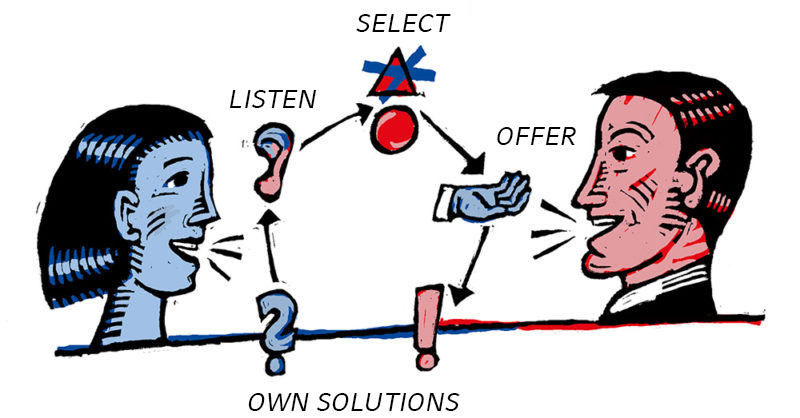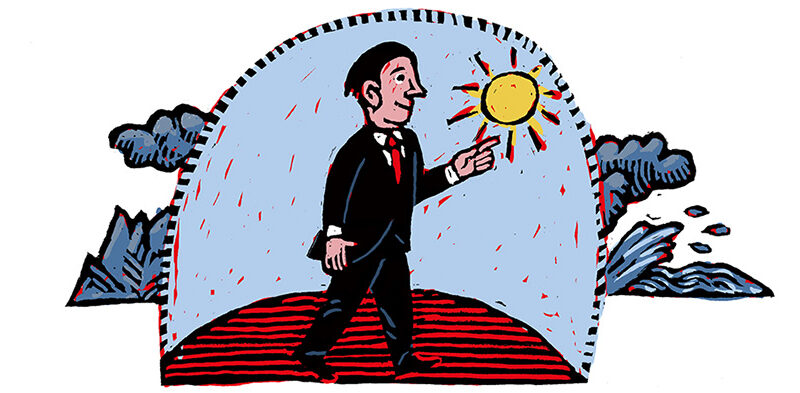Portfolio/Theory
Portfolio/Theory

Portfolio
- Solution-focused, systemic coach for top management, executives, and dedicated experts
- Solution-focused Team Coaching
- Solution-focused Mediation (Conflict Coaching)
- Speed Coaching / Brief Coaching
- Schema Coaching based on the Schema Mode Model
- Individual communication consulting
Theory
Finding Solutions rather than Solving Problems: The Solution Focus in Coaching

It is with unmatched ease that solution-focused coaching invites us to use our mental and emotional imagination for the development of our preferred future rather than intensely dwelling on our problems. As an SF Coach I will ask my clients solution-focused questions with open-minded curiosity and constructive concentration.
And I offer my clients a fascinating core assumption: I am convinced that they already hold all the knowledge, that they have all the competences and strategies needed to develop the best solutions to their issue. As coach, I accompany this development process by listening attentively and, by asking questions about their preferred future, by creating a framework in which thoughts, emotions, ideas and challenges can be shaped into achievable future objectives.
Once the preferred future, best hopes, highest expectation have been worked out, we think back to where clients came from and imagine first concrete steps they might have taken to achieve their goals. This process of finding solutions rather than solving problems works for all types of coaching, individual and team coaching as well as for the mediation of conflicts.

Abb.: Daniel Meier, Lösungsorientiertes Teamcoaching, SolutionSurfers©, Luzern
Schema-Coaching

I am deeply convinced of the impact and great value of solution-focused thinking. And yet it may be useful to do something different from time to time. When clients struggle to implement steps towards their preferred future once they are back in their job setting, when they feel blocked, when they simple cannot imagine a solution that works, we can, if clients wish, take a closer look.
What can I do when clients feel at a loss when trying to develop their preferred future or, in their professional or private environments, fail to gain access to their self-efficacy or the effects of their behavior patterns on others? Maybe we could try and understand where our less useful behavior patterns come from. It may turn out easier then, to confront them with an energetic Stop it!
Looking for the appropriate coaching approach, I came across schema therapy as the theory foundation for schema coaching. The therapy model itself (Jeffrey E. Young, 1990) itself is an integrative approach of cognitive behavior therapy and is suited for a broad spectrum of mental disorders. Its main focus is on central emotional needs. Schema therapy is effective both in the reduction of specific symptoms and the improvement of general quality of life. Its application, however, is limited to a psychotherapeutic context and thus only reserved to licensed psychological or medical psychotherapists, and rightly so.
However, emotionally charged life issues or schemata can also be found in difficulties that are not related to disorders. Schema Coaching allows us to look at them and decide what we want instead.
The following basic principles of schema therapy are particularly interesting for coaching:
- There are five core needs in childhood and adolescence, which need to be met by close persons (parents and others):
- safety/predictability/love/stable base/protection
- autonomy/acceptance and praise
- freedom to express one’s own feelings and get them validated
- play and spontaneity
- guidance and the experience of realistic limits
- Early unhealthy schemas develop when healthy, normal development needs of a child are not met adequately over a long period of time, e.g., distrust, defectiveness, unrelenting standards, emotional deprivation, dependence or insufficient self-control.
- The ways in which a vulnerable child adapts to a distressing childhood environment are similar to what we know from animals, when being attacked: freeze (schema surrender by compliance, isolation, etc.), flight (schema avoidance by protective distance, substance misuse, expression of anger, etc.), fight (schema overcompensation by aggression, recognition-seeking, dominance, etc.).
These coping strategies may have been helpful as a child, yet to an independent, self-contained adult they can prove harmful both in professional and private life. For coaching, it is perfectly sufficient, to only have a brief look at the reasons behind and at the triggers of entrenched behavior patterns. When we understand where emotionally charged life issues come from, we find it easier to imagine and develop a more beneficial self-validation and to decide ourselves how we would like to shape our preferred solution (rather than always automatically react to a trigger in the same pattern). The kindness and clear structure of the model fit perfectly into a coaching conversation and, in my experience, has turned out to be extremely useful. In order to stay within the boundaries of coaching, I take regular supervision by experienced schema therapists.
